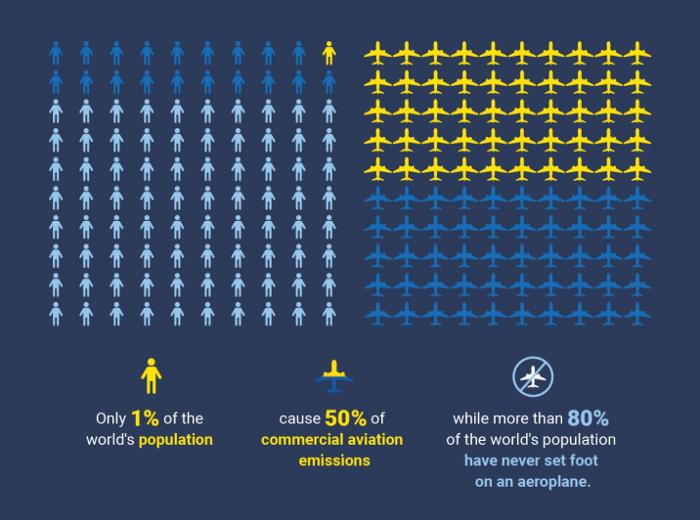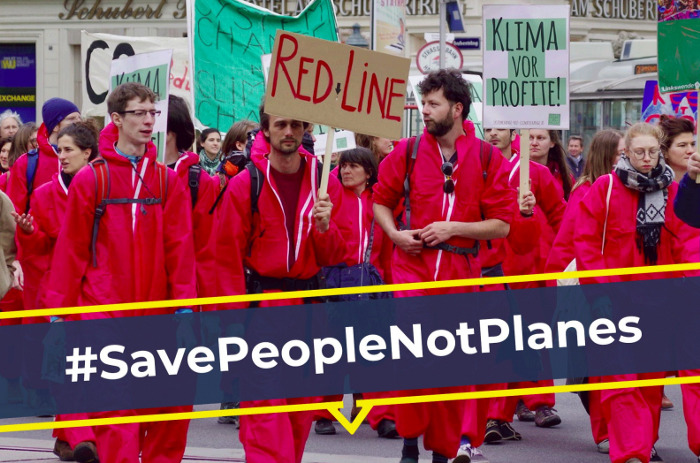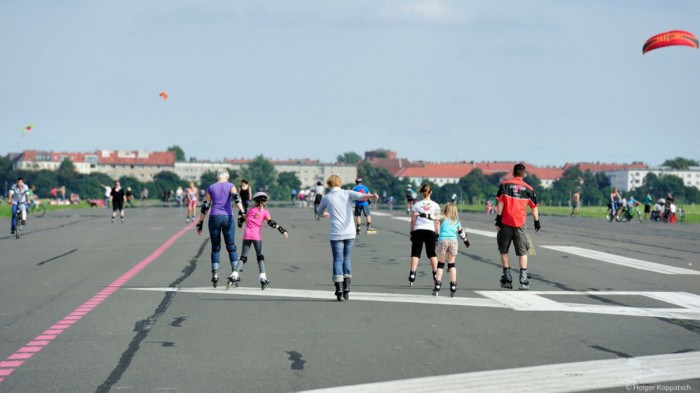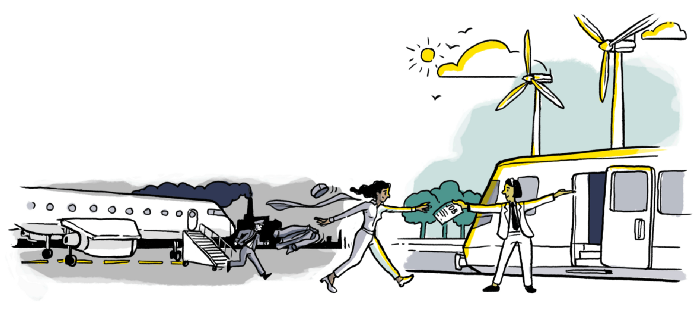A Rapid and Just Transition of Aviation
February 16, 2021
COVID-19 has grounded air traffic almost entirely. In countries under lockdowns, operating flights dropped well below 10% for many months. The aviation industry itself expects to be operating at a lower capacity for the next three to five years and the tourism sector faces a prolonged global crisis. Workers in the aviation industry, as well as communities dependent on tourism, have been among the hardest hit. On top of COVID-19, there are further changes coming due to automation, digitalisation and of course climate heating. (We use the word “climate heating” or “climate crisis/breakdown” instead of “climate warming” or “climate change”, as framing theory shows that “warming” and “change” have positive connotations, while actually the effects will be devastating.)
So let’s be realistic: aviation will change, and it will do so either by design or by disaster. We propose to choose design.
In 2018, emissions from civil aviation were responsible for around 6% of climate heating worldwide and growing. Interestingly, half of this impact was caused by frequent flyers who represent just 1% of the world’s population. Meanwhile, more than 80% of people have never been on an airplane.

While research and development may bring emissions from aircraft down in the future, no realistic technological options for green passenger flights are in sight for the next decades — especially not for a rising number of planes, as envisioned by the industry. A demand reduction especially in countries of the Global North can’t be avoided and a rapid transition towards climate-safe mobility is therefore needed. However, this transition should not bring about devastating effects for people and communities: we need a justtransition. Now is a good moment for initiating it.
Unconditional bailouts for the industry
When COVID-19 hit the sector, airlines immediately sought state support, emphasising their 2.7 million jobs globally. As of August 2020, governments or government-backed entities from 57 countries had committed €137 billion in taxpayer-funded financial aid to airlines — 38% of the projected revenue loss for airlines for 2020. In Europe alone, governments agreed to deliver €42,8 billion in bailouts to airlines. This money was granted without effective social or environmental conditions, in spite of global protests, demanding to #SavePeopleNotPlanes and being opposed even by economists. The two cases where some environmental strings were attached — Austria and France — have been shown to have little substanceor conflicting goals.
Despite the bailouts, at least 400,000 workers have already been fired or are in jeopardy, and many of those who remain employed are facing permanent pay cuts and re-written contracts with worse conditions, as some airlines are clearly exploiting this crisis to impose terms and conditions which further disadvantage workers. Enforcing strong social conditions in bailouts is challenging. The question is: Does it make sense to pay airlines and airports to maintain an oversized workforce for years? Or should the money rather support employees who drop out of the industry to find decent climate jobs? The Stay Grounded network, 100.000 people and over 300 organizations demand to stop using taxpayers’ money for bailing out polluting airlines, airports and related manufacturers. Instead, recovery packages need to finance a just transition: a living wage and social protection for workers leaving the industry, retraining programmes, creation of jobs in climate-safe sectors and for fostering alternatives to flights and mass tourism.

Climate-just mobility: Future-proofing companies and jobs
For airlines or aircraft manufacturers to survive as companies, switching their business model could be a smart choice.
Back in 1976, the workers at Lucas Aerospace produced a comprehensive plan to switch to making more socially useful products. And at the beginning of the COVID-19 pandemic, an Airbus plant in the UK was re-purposed to produce life-saving ventilators. Amidst the threat of massive job cuts at manufacturers, there are currently several worker initiatives to develop transition plans. Another approach is for airlines to merge with rail companies to become integrated public transport providers. This approach has been proposed in the UK and in Germany and could make it easier to keep and shift jobs. A merging of troubled airlines, for example into one European Union Airline could also help to wind-down the harsh competition in the sector that has been to the detriment of workers and the climate. One combined airline could provide the flights still needed, with taxed kerosene and union representation.
Infrastructure can also be recycled: in the very centre of Berlin, the former Tempelhof airport now serves as a huge recreational park, with long skating tracks, community gardens, arts spaces and new bird and insect habitats. Airports could likewise be converted to research centres, hospitals or other useful purposes.

Besides a number of relatively specialized or unskilled workers who will need retraining, there are also plenty of aviation sector workers who already have transferable skills, such as people working in sales, marketing, management, customer service, logistics, data analysis, engineering, manufacturing or cleaning. Airline employees could be directly redeployed to railways, which are in need of workers in countries such as Spain, Switzerland and Germany. Germanwings is already advising its flight attendants to become train attendants. Even more jobs will become available as flights are shifted to trains.
A transition to a climate-friendly economy centered on people will need collective effort and workforce, which is why the “jobs argument” is not valid against socio-ecological transformations. Some of the sectors that will absorb workers are recycling materials and infrastructure, expanding renewable energy, agro-ecological food production, regionalised production to reduce freight, afforestation and staffing health and social services. The massive bailouts mentioned earlier show that the money to finance all this exists.
Decelerated lifestyles and new work time arrangements like more flexible and reduced working hours with the chances to take sabbaticals could allow people to take time to travel, experiencing the journey and connecting with locals. Reducing working hours can also be an option to support a just down-scaling of industries redistributing the work amount among existing employees. Real global connections will still be important — but regionalised, circular economies could allow for both a diversity of local jobs and consumption of more local goods, reducing “food miles’’ and reliance upon air-freight.

Cultural changes need to go along with structural changes such as attractive and affordable alternatives to flights (e.g. day and night trains, modern sailing ships). COVID-19 showed that a world with reduced aviation is actually possible. A vast majority of Europeans intend to fly less frequentlyfor environmental reasons once COVID-19 restrictions are lifted, and online conferences can surely continue to replace much business travel. Today, aviation is a central part of a globalised, fossil fueled model that has led us into the climate emergency. Responding to this emergency will require a societal transformation involving new modes of living, working, producing and consuming. Flying is the biggest single chunk of greenhouse gas emissions in a high-emissions lifestyle — and it could become a flagship for change to a more just and climate-friendly world. A first step would be to use public money to save people, not planes. We invite you to get involvedin the organizing efforts to stop aviation growth.
For more information, check out Stay Grounded’s Just Transition of Aviation paper.
